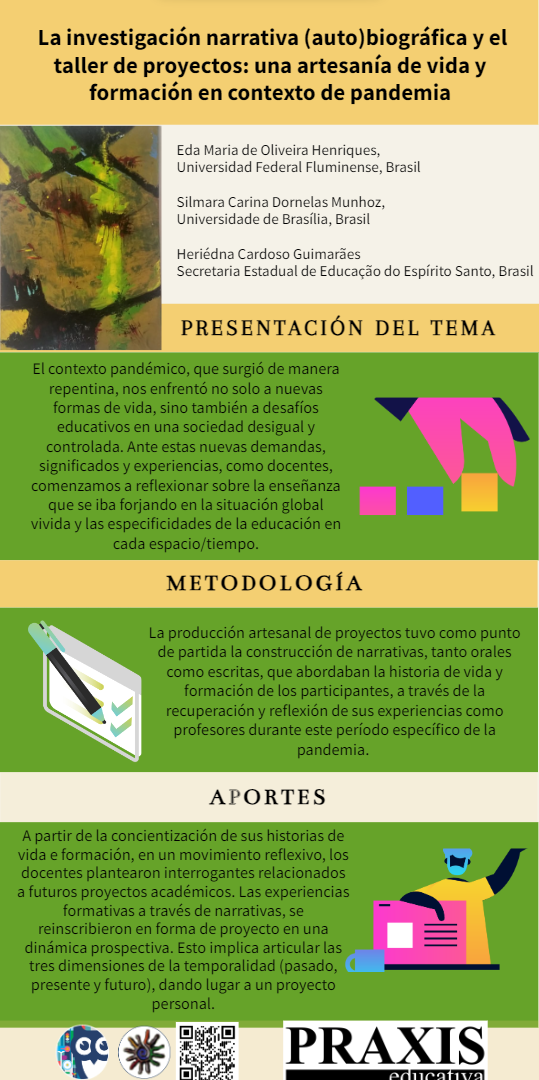(Auto)biographic narrative research and project workshops: a artisanship of life and formation in pandemic context
DOI:
https://doi.org/10.19137/praxiseducativa-2024-280111Keywords:
Narrative (auto)biographical research-formation; Project Workshop; Pandemic; Teaching; SchoolAbstract
The pandemic context that began suddenly brought us, along with new ways of living, educational challenges to be faced in an unequal society governed by control. This article brings the experience of an extension course inspired by Delory-Momberger's biographical project studio, aligned with the (Auto)Biographical Narrative Research-training approach, carried out with a group of basic education teachers from public schools, mostly from Rio de Janeiro state. The proposal consisted of creating a conversation space for the artisanal production of research projects, presenting as a starting point the construction of narratives, oral and written, about the life history and training of the participants, through rescue and reflection of experiences as teachers in this specific period of pandemic. Based on this awareness, in a reflective movement, the teachers raised questions related to future academic projects.
Downloads
References
Bolívar, A. (2014). A expressividade epistêmico-metodológica da pesquisa (Auto)Biográfica. En M. H. M-B.
Abrahão, I. F. de S. Bragança y M. da S. Araújo (Ed.), Pesquisa (auto)biográfica, fontes e questões (pp.
-127). CRV.
Bragança, I. F. de S. (2018). Pesquisaformação narrativa (auto)biográfica: trajetórias e tessituras teórico
metodológicas. En M. H. M-B. Abrahão y J. L. da Cunha (Ed.), Pesquisa (auto)biográfica: diálogos epistémico
metodológico (pp. 65-81). CRV.
Cunha, M. I. da. (2010). Narrativas e formação de professores: uma abordagem emancipatória. En E. C de
Souza y R de C. Gallego (Ed.), Espaços, tempos e gerações: perspectivas (auto)biográficas (pp. 199-213).
Cultura Acadêmica.
Deleuze, G. (2013). Conversações. Editora 34.
Delory-Momberger, C. (2014). Biografia e educação: figuras do indivíduo projeto. Paulus.
Ferrarotti, F. (2010). Sobre a autonomia do método biográfico. En A. Novoa y M. Finger (Ed.), O método
(auto)biográfico e a formação (pp. 29-56). EDUFRN.
Foucault, M. (2006). Diálogo sobre o poder. En M. Foucault. Estratégia, poder-saber (pp. 253-266). Forense
Universitária.
Foucault, M. (2014). Vigiar e punir: nascimento da prisão. Vozes.
Henriques, E. M. De O. y Guimarães, H. C. y Rodrigues, V. F. N. (2021). Paulo Freire e pesquisa narrativa
(auto)biográfica: diálogos entre leitura do mundo, de si e de trajetórias de formação. Revista Teias, 22(67), 145-
https://www.e-publicacoes.uerj.br/index.php/revistateias/article/view/62031/39923
Henriques, E. M. de O., & Munhoz, S. C. D. (2022). Ateliê de Projetos: Narrativas de vida e formação em
diálogo com propostas acadêmicas [Review of Ateliê de Projetos: Narrativas de vida e formação em diálogo
com proposta acadêmicas].
esso=&tipo=0&palavras=&resp=&area=0&inst=0&apro=0&exec=0&sit=0&ordenar=1&direcao=1&inicio=0
&termino=0-00®iao=&estado=0&bplataforma=1
Josso, M. C. (2010). Da formação do sujeito... Ao sujeito da formação. En Novoa y M. Finger (Ed.), O método
(auto)biográfico e a formação (pp. 59-79). EDUFRN.
Laval, C. y Dardot, P. y Bregalda, R. (2021). Dialogue avec les éducateurs. Revista Espaço Pedagógico, 28(1),
-419. http://dx.doi.org/10.5335/rep.v28i1.12804
Lobo, A. P. S. L. L., Coube, R. J., Henriques, E. M. De O. y Silva, D. M. (2021). Narrar para existir e resistir:
reinventando diálogos nos cotidianos de formação em contextos de pandemia. En Anais do Seminário Fala
Outra Escola. UNICAMP.
https://www.even3.com.br/anais/xfalaoutraescola2021/371965-narrar-para-existir-e-resistir
-reinventando-dialogos-nos-cotidianos-de-formacao-em-contextos-de-pandemia/
Mariano, A. L. S. (2006). O início da docência e o espetáculo da vida na escola: abrem se as cortinas. En E. F.
Lima (Ed.), Sobrevivências: no início da docência (pp. 17-26). Liber Livros.
Nóvoa, A. y Alvim, Y. C. (2021). Covid-19 e o fim da educação: 1870 – 1920 – 1970 – 2020. Revista História
da Educação, (25)e110616, 1-19. https://seer.ufrgs.br/index.php/asphe/article/view/110616/pdf
Nóvoa, A. y Finger, M. (2010). O método (auto)biográfico e a formação. EDUFRN.
Passeggi, M. Da C. (2020). Enfoques narrativos en la investigación educativa brasileña. Paradigma, (XLI),
-79. http://revistaparadigma.online/ojs/index.php/paradigma/article/view/929
Preciado, P. B. (28 de março de 2020). Paul P. Preciado: Aprendendo com o vírus. El Pais.
http://agbcampinas.com.br/site/2020/paul-b-preciado-aprendendo-com-o-virus/
Sibilia, P. (2015). O homem pós-orgânico: a alquimia dos corpos e das almas à luz das tecnologias digitais.
Contraponto

Published
Issue
Section
License
Copyright Notice
Editorial Committee Educational Praxis Magazine:
I hereby declare that I am the author of the article titled (article name), that it is original and my own and that it was not previously published in any other format or medium. I declare to know that the magazine will not charge me any type of fee under any circumstances, nor will I receive any type of monetary compensation If it were accepted for publication in Educational Praxis, I authorize the aforementioned magazine to publish it digitally and to advertise it on its social networks.
If the work is published, I adhere to the Creative Commons license called "Attribution - Non-Commercial Share Alike CC BY-NC-SA", through which it is allowed to copy, reproduce, distribute, publicly communicate the work and generate derivative works, as long as when the original author is cited and acknowledged. This license has been used since September 2018. In 2016 CC BY NC ND 4.0 was adhered to; and in the years 2017 and 2018 (January-August) CC BY NC 4.0.
This CC BY-NC-SA Share Alike license does not, however, permit commercial use of the work. As an author, the journal may establish additional agreements for the non-exclusive distribution of the version of the work published in the journal, it allows me to self-archive the published articles, in their post-print version, in institutional, thematic repositories, personal web pages or any other relevant use. with the recognition of having been first published in this journal.
Educational Praxis adheres to DORA (Declaration on Research Assessment) signed in San Francisco, California, on December 16, 2012, and to the Declaration of Mexico (Joint Declaration LATINDEX - REDALYC - CLACSO - IBICT).














_(1)2.png)


3.png)











_(2).png)






2.jpg)









